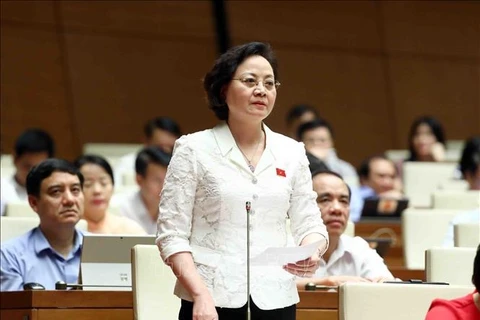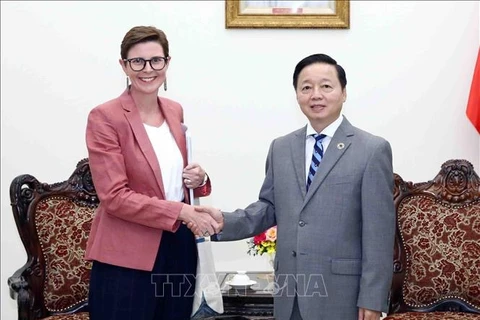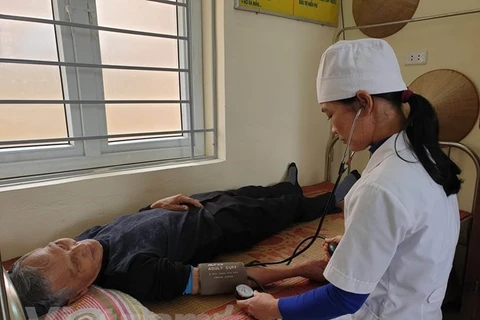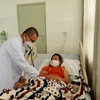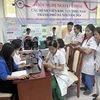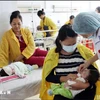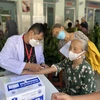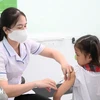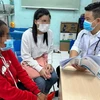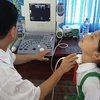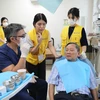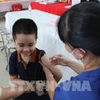Hanoi (VNA) - Among the health sector’s 10 outstanding events in 2023, the issuance of Directives and Resolutions by the Party Central Committee’s Secretariat and the National Assembly on improving the quality of grassroots health operations was evaluated as its most important move.
Reporters of the Vietnam News Agency’s VietnamPlus e-newspaper interviewed Associate Professor Phan Le Thu Hang, Deputy Director of the Department of Financial Planning under the Ministry of Health to better understand the sector’s strategic directions for development in the coming time. Hang is director of a project on investment in building and developing the grassroots healthcare system.
Reporter: Directive No. 25-CT/TW sets out requirements to improve state management efficiency and responsibility in building and implementing guidelines, policies and laws on grassroots health. Could you please give more details about this content?
Associate Professor Phan Le Thu Hang: Directive No. 25 of the Secretariat places higher requirements on thinking, responsibility and action of party committees, authorities and the entire political system regarding grassroots healthcare.
Regarding the mindset it is a requirement to raise awareness of the role, position, and importance of grassroots healthcare with primary healthcare tasks. This includes first aid, medical examinations and treatment, personal health and non-communicable disease management. It also includes epidemic prevention and control and improvement of public health and population work programmes, for all people to receive regular health care right in the community.
Regarding action, there are higher demands on the quality of leadership, direction, inspection and supervision of grassroots health. This includes the improvement of policies and laws on grassroots healthcare as well as increasing the efficiency of state management and responsibilities of coordination between agencies and organisations in building and implementing guidelines, policies and laws on this issue.
Reporter: The goal is to have at least one full-time doctor at each medical station, and a professionally trained health worker in each village/hamlet by 2030. To improve professional quality, the important requirement is to improve the quality of grassroots health human resources with appropriate quantity and structure, and have appropriate salary, allowance and remuneration policies for grassroots health workers. Could you please tell us the implementation roadmap?
Associate Professor Phan Le Thu Hang: As we know, improving the quality of grassroots medical human resources with appropriate quantity and structure and ensuring this contingent works effectively in providing primary healthcare services to the community is a requirement emphasised in the Secretariat’s Directive No. 25.
In the coming time, the Ministry of Health will coordinate closely with relevant ministries, sectors and localities to continue perfecting the policy framework related to grassroots health workforce development. It will implement core solutions to promote the sustainable development of grassroots medical human resources, such as training, retraining, and continuously updated training. Salary and benefit packages will also be improved to retain human resource.
Reporter: Regarding expertise, Directive No. 25 mentions the need to increase resources for preventive medicine, early detection of diseases, and gradually expand the list of services within the scope of grassroots healthcare covered by insurance in accordance with the premium level. What does this mean for the protection and care of primary health of people?
Associate Professor Phan Le Thu Hang: The priority orientations for investment in grassroots health and preventive medicine mentioned in Directive No. 25 are very important for the protection, care and improvement of people's health. For the grassroots health network itself, these orientations help improve the capacity, including professional, management and financial capacity of the network in a sustainable way.
For the health system in general, these orientations support the creation of a more balanced system between primary healthcare, basic healthcare and specialised healthcare. This will improve the equality as well as the efficiency of resource use for health care and improve the impact on people's health status.
For the community, these orientations help people optimise their healthcare activities by proactively improving their health, and finding and using appropriate medical services in the best convenient way.
Reporter: We also have measures to encourage private healthcare, organisations and individuals to participate in providing primary and preventive services, and connecting with personal health management, while developing the family doctor model and establishing a flexible professional referral system. Could you tell us the roadmap for implementing these ideas?
Associate Professor Phan Le Thu Hang: As we know, Directive No. 25 of the Secretariat has given many new directions on developing the grassroots health network in the new situation, including encouraging private healthcare, organisations and individuals to participate in providing primary healthcare and preventive healthcare services, and connecting with grassroots healthcare in personal health management, while developing the family doctor model and establishing a flexible professional referral system.
In the coming time, the Ministry of Health will coordinate closely with localities to build and perfect the policy framework and professional guidance system on these issues, and on that basis, will proceed with step by step implementation such as piloting, evaluating and expanding the scope of implementation.
For example, in order to effectively mobilise the participation of non-public health in primary healthcare, in the coming time we need to research concerted solutions on governance such as determining the priority scope given to non-public healthcare, enhancing collaboration, minimising the risk of conflicts of interest between public and non-public health care, both technically (ensuring service quality) and financially ( increasing financial attractiveness when providing primary healthcare services).
Reporter: In the context of strong digital transformation, the information technology system in grassroots healthcare operations is promoted, how is the connection between grassroots healthcare with higher-level healthcare and people strengthening in remote medical consultation, check-ups and treatment, statistics, and data management done?
Associate Professor Phan Le Thu Hang: In the health field, there are three very important factors that every health system can hardly improve at the same time: coverage, service quality, and costs (likened to the three vertices of a triangle). For example, if we strive to ensure high-quality, universal healthcare services, it means we have to accept increasing healthcare costs. However, recently, with the fourth industrial revolution and the booming development of information technology and telecommunications, it is believed that smart medical solutions can help us overcome the challenge in "The triangle of coverage, service quality and medical costs”. Therefore, digital transformation for the healthcare sector is an irreversible trend.
As for grassroots health activities, in the coming time, the sector will prioritise promoting the application of information technology and digital transformation to improve all aspects of grassroots health operations, with focus on upgrading information technology infrastructure, training human resources to operate, completing policies to encourage digital transformation as well as perfecting the technical guidance system.
Reporter: Thank you very much!

